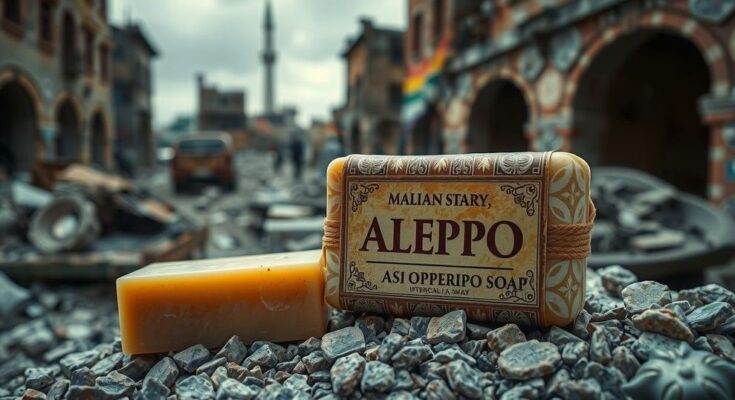UNESCO has awarded Aleppo soap the status of intangible cultural heritage amidst renewed conflict in Syria’s second city. Artisans have crafted this traditional soap for 3,000 years, using olive and laurel oils, although only 10 of the original 100 factories remain operational. This recognition emphasizes the cultural significance and community collaboration essential to its production.
In a significant move amidst ongoing conflict, UNESCO has officially recognized Aleppo soap as an item of intangible cultural heritage. This announcement was made as Syria’s second-largest city, Aleppo, once again finds itself engulfed in violence, following an Islamist-led rebel takeover last week. For approximately 3,000 years, local artisans have combined olive and laurel oils to craft this traditional soap, a practice that is integral to the community’s cultural identity. Although the city has seen a decline in the number of operational soap factories—dropping from 100 to merely 10—Aleppo soap continues to hold cultural and familial significance, as it is produced through a collaborative process among families, fostering unity and cooperation. UNESCO emphasized the integral role of this craftsmanship, highlighting the reliance on natural ingredients and an extensive drying time that is crucial for the soap’s quality. Aleppo soap joins the ranks of other cultural legacies, such as the region’s traditional music, which is also recognized by UNESCO. Despite the ongoing struggles due to civil unrest, this recognition of Aleppo soap serves as a testament to the enduring spirit and cultural heritage of the region.
The recognition of Aleppo soap by UNESCO is particularly poignant given the historical and cultural significance of this artisanal product, which has been manufactured in Aleppo for thousands of years. The traditional process not only involves the use of local ingredients but is also a representation of the craftsmanship and community spirit. The city of Aleppo has been declared a UNESCO World Heritage site since 1986; however, it has faced significant challenges due to the protracted civil war that began in 2011. With substantial damages to its cultural heritage, the fortification of Aleppo soap’s status offers a glimmer of hope for its cultural preservation amid ongoing conflicts. This heritage recognition aligns with broader efforts to sustain traditional practices under threat from modern turmoil, aiming to preserve ancient knowledge and skills for future generations.
In conclusion, UNESCO’s designation of Aleppo soap as an item of intangible cultural heritage underscores the importance of preserving traditional practices amidst the challenges posed by ongoing conflicts in Syria. This recognition not only highlights the cultural significance of Aleppo soap but also champions the artisans’ role in fostering community solidarity. As Aleppo faces a tumultuous period, the acknowledgment of its heritage may serve to bolster attempts to maintain and celebrate its rich cultural history.
Original Source: jordantimes.com




